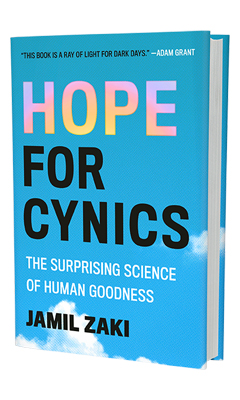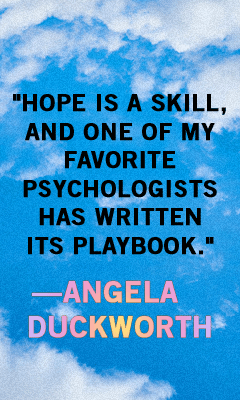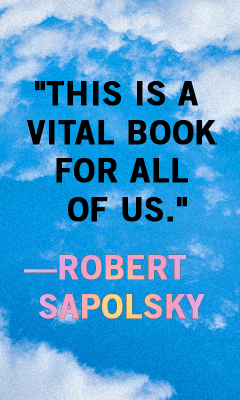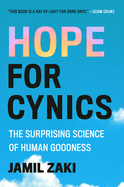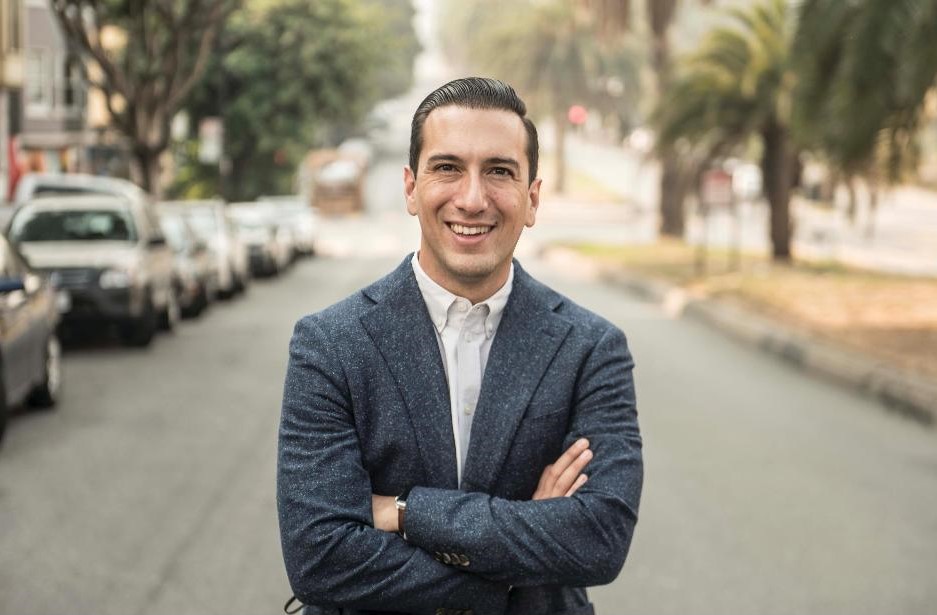Hope for Cynics: The Surprising Science of Human Goodness
by Jamil Zaki
Jamil Zaki's perceptive second book, Hope for Cynics: The Surprising Science of Human Goodness, is a data-driven examination of the high levels of mistrust in society today. Inspired by the success of global conflict resolution initiatives created by the late Emile Bruneau, a friend and colleague, Zaki thoroughly investigates strategies for rebuilding our faith in one another.
Hope for Cynics deploys science as a tool for understanding why we consistently underestimate goodness and honesty in others, shining an intriguing lens on how "high-trust" countries, corporations, and neighborhoods fare much better during adversity compared with those where trust is low and cynicism toward government, leadership, and neighbors is rampant. In addition to his marvelous storytelling and evidentiary analysis, Zaki demonstrates tremendous courage in documenting a deeply personal quest to challenge his own cynical mindset and the misplaced assumptions that underpinned his interactions with others.
Defining cynicism as "the theory that people are selfish, greedy, and dishonest," Zaki invites readers to contemplate its impact on our worldview and how it affects one's daily interactions with, and attitudes toward, others. It doesn't help that politicians incite voter cynicism toward their opponents, while media companies "trade in judgment and outrage." As Zaki succinctly articulates, "Our cynicism is their product and business is booming." Expanding on decades of science on the topic, he shows how a cynical mindset erodes trust and dampens our relationships with each other, wearing away at the "psychological glue that binds us." Yet despite its proven impact on health, including a stronger likelihood of depression, heart disease, and isolation, our culture glamorizes cynicism under the misconception that cynics are more intelligent and sophisticated than the rest of us. He calls this the "cynical genius illusion," and finds it has surprising staying power, despite evidence that cynics perform worse on cognitive, problem-solving, and mathematical tests than non-cynics.
Zaki (The War for Kindness) is a professor of psychology at Stanford University and director of the Stanford Social Neuroscience Lab. He has studied kindness and empathy and taught people around the world about the importance of these virtues. As an "unofficial ambassador for humanity's better angels," he is often recruited to "jump-start people's faith in one another." Yet in private, he struggles with cynicism and is prone to seeing the worst in people, a way of thinking that "forecloses on the possibility of anything better." In this he aspires to be more like Emile Bruneau, who was buoyed by a worldview in which he searched for the best in others and treated them accordingly. The author describes his friend's personal philosophy as hope buttressed by a healthy dose of skepticism that leaves the door open for dialogue and trust-building, and he offers readers a valuable blueprint for incorporating his highly promising philosophy of "hopeful skepticism" into their own lives, along with an appendix of practical strategies for cultivating this mindset.
One of the most remarkable research findings summarized in Hope for Cynics is that most people fail to realize how generous, trustworthy, and open-minded others really are, consistently underestimating their colleagues, neighbors, and strangers. To demonstrate this, Zaki furnishes simple experiments for readers to conduct for real-time feedback on where we sit on the spectrum of cynicism. The average person, he deduces, "underestimates the average person," a lamentable state of affairs that sometimes takes root at a young age, either because of a child's insecure attachment to their caregiver or as a result of the overly cautious messaging helicopter-style parents transmit to their young. Considering Bruneau's technique of "underbearing attentiveness"--security plus the freedom to be curious--the author's 2022 research study found that people with differing viewpoints, when invited to do so, are eager to engage with the other side. Spending time with people we disagree with, "disagreeing better," and seeing the humanity in others are crucial ingredients for reducing cynicism.
The case of Megan, a self-proclaimed "California Progressive," is illustrative. A disillusioned Bernie Sanders devotee, she found herself drawn to QAnon conspiracy theories and its vast online community. Childhood anxiety fueled by insecure caregiver attachments made her vulnerable to the extreme cynicism peddled online; however, the unwavering acceptance (but not agreement) of her boyfriend and her father helped her migrate away from the "cultlike community" and back to security. Describing his own childhood insecure attachments, Zaki recounts how, with concerted effort and loving relationships in adulthood, he was able to achieve "earned attachment: a sense of safety and connection later in life" and the space to let go of the rigid thinking that is a hallmark of the cynical mind. As a parent, he practices underbearing attentiveness, with the goal of providing his children both security and the freedom to be curious.
With his potent message of cultivating faith in others and finding common ground in the face of seemingly intractable conflicts, Zaki concludes that hope is not a weakness but "a path to being less wrong and more effective." As he gracefully observes, "humanity is far more beautiful and complex than a cynic imagines, the future far more mysterious than they know." --Shahina Piyarali



